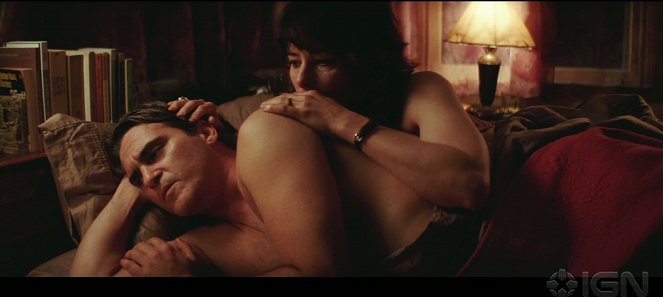Rendező:
Woody AllenForgatókönyvíró:
Woody AllenOperatőr:
Darius KhondjiSzereplők:
Joaquin Phoenix, Emma Stone, Nancy Carroll, Allison Gallerani, Brigette Lundy-Paine, Katelyn Semer, Betsy Aidem, Ethan Phillips, Jamie Blackley (több)Tartalmak(1)
Abe Lucas (Joaquin Phoenix) filozófiaprofesszor padlót fogott, semmi értelmét nem látja az életének. Úgy érzi, képtelen a boldogságra, bármibe kezd, minden ésszerűtlennek tűnik a számára, sem a tanításban, sem az írásban nem talál már örömet. Amikor egy kisvárosi főiskolára megy tanítani, a megközelíthetetlen professzor két nő romantikus fantáziáját is beindítja, ám még ez sincs igazán hatással az apátiától, az unalomtól és a kilátástalanságtól szenvedő férfi életére. Rita Richards (Parker Posey), a magányos, boldogtalan házasságban élő professzornő azt reméli, Abe-bel való viszonya megváltást hoz számára. Úgy érzi, végre megtalálta azt a férfit, akivel elszökhet Európába, maga mögött hagyva egyhangú életét. Jill Pollard (Emma Stone), Abe legjobb tanítványa pedig hamarosan a férfi legközelibb barátjává válik, és ellenállhatatlan vonzalmat kezd érezni lehangolt tanára iránt. A gyönyörű, fiatal Jill szereti a barátját (Blackley), de Abe művészi beállítottsága, titokzatos múltja és egyre fokozódó letargiája egyre jobban elbűvöli őt. Ám amikor megpróbál közeledni tanárához, a férfi visszautasítja. Egy véletlen esemény azonban egy csapásra felforgatja Abe életét. Amikor Jill-lel fültanúi lesznek egy különös beszélgetésnek, a férfi olyan tettre szánja el magát, ami kirántja eddigi értelmetlennek tűnő, sivár létéből. Ismét képes élvezni az élet apró örömeit, újra írni kezd, és energiával telten még a romantika is magával ragadja. Abe váratlan döntése azonban olyan események sorozatát indítja be, amely Jill, Rita és a saját életét is örökre megváltoztatja. (Freeman Film)
(több)Videók (3)
Recenziók (6)
Woody light. A szereplők lassú és kiszámítható kapcsolati összefonódása fokozatosan alakul át érdekesebb és - egy ilyen súlyos témához képest - bájosan játékos filozofálgatássá az élet értelméről, az ítélkezés jogáról és a tettek következményeiről. A jelenet, amelyben élet forog kockán, nem izgalmas, de talán nem is kellett volna annak lennie.
()
A sensationally cynical anecdote about what can bring back someone’s zest for life. Woody Allen once again played with Dostoevsky's “Crime and Punishment", it worked out great and I hope he counts on Emma Stone for another movie because she is SO cute! Joaquin Phoenix surprised me with the way he took on the role of a retired philosophy professor. I wouldn't have expected him to be the one to believe in such a position. "I have greatly succeeded in my attempt to commit the perfect crime."
()
There was a time when I enjoyed Woody Allen's films solely for Woody Allen himself. However, that gradually changed. His affected character stopped entertaining me, and eventually, it really started to grate on my nerves. These days, I can still appreciate some of his movies, but the condition for a positive experience is his absence. This film met that basic requirement, and I quite enjoyed its philosophy of murder. Joaquin Phoenix and Emma Stone are great actors and deserve an above-average rating without a doubt. / Lesson learned: The perfect crime is like a perpetual motion machine or the elixir of life.
()
With this fresh film, Woody Allen once again charmed me. I really love his philosophizing, which he scatters around in abundance without even asking if anyone still cares. In Irrational Man, however, he managed to almost perfectly blend all those existential thoughts with subtle, unobtrusive humor and then let this explosive mixture detonate in a brilliantly timed battle for life. Since I've already praised the director, I can't overlook Joaquin Phoenix either, for whom the titular role fit like a glove, and he clearly relished it with gusto. (90%)
()
Woody no longer even tries to disguise the fact that the whole story is merely an illustration of a particular intellectual concept and a pretext for philosophical discussion. In order to make his work easier, he alternately articulates his thoughts through two narrators (one of whom speaks to us from who knows where) and an infinite number of “walk and talk”/“sit and deliver” verbal exchanges. Other than the climax, which offers the film’s only funny moment, I’m trying in vain to recall a scene that is based not on what we hear, but on what we see (as beautiful as Khondji’s romantic shots of the setting sun are, they serve the narrative only minimally). The half-baked plot would have perhaps served better for one segment in a story cycle. The plot twists are so predictable (the only surprise lies in the choice of the murder weapon, as it is initially indicated that it could be something else) and, at the same time, implausible in the style of Hitchcock (but without a well-developed narrative structure that would draw us in and draw our attention away from their implausibility), and the plot is pushed forward so lazily that I felt as if I had spent a good three hours in the cinema. After a promising opening scene, the film turns into the tedious mush of an idea that Allen dealt with much better in his earlier films (Crimes and Misdemeanors, Match Point). In addition to its literary nature and very shoddy narrative, The Irrational Man is connected with Allen’s late-period work through the cliché of the irresistible masculine protagonist with whom all of the female characters immediately fall in love – sweet, but absolutely unconvincing (through no fault of the actresses). Despite that, the actors remain the only reason not to experience The Irrational Man in book form (if such a book existed). Woody would do better next time not to waste time with directing and not to torture viewers with a narrative devoid of suspense and surprise, instead putting his thought-provoking scenarios down only on paper. 55%
()



Hirdetés